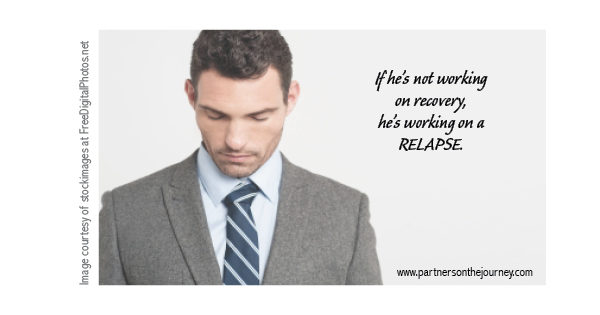Relapse happens
From time to time my husband and I will have an old client call out of the blue to make an appointment with us. Unfortunately, they rarely call because they just want to tell us how great they’re doing—it’s usually because of a relapse.
The scenario is almost always the same. They arrive. We chit-chat cheerfully for a few moments, and then one of us asks them, “So what brings you here today?”
The mood of the room instantly changes and clouds roll in. Our guest begins to fidget and look down at the table. After a few minutes they blurt out that they have recently slipped back into their old compulsive behaviors. They usually go on to say that, after attending our recovery program, they had been doing very well for months— even years. They were feeling good about how far they had come and really believed that the addiction was behind them . . . and then . . .
As we go on to talk about what lead up to the “and then,” their story, again, begins to sound familiar. Little by little they had stopped doing the things that they had discovered would take the power away from their old triggers and keep them on the path to a healthier, addiction-free life. It’s THAT simple!
We’ve learned that a relapse is rarely planned and seldom intentional. It’s almost always a subtle decline by degrees. Most individuals aren’t even aware that they’ve wandered off the path to freedom—until it is too late.
The Red Flags of Relapse
Relapses are almost never instantaneous. There are usually warning signs that were missed. The majority of those who do relapse will exhibit one (or all) of the three most common symptoms. Learning to recognize them before they become a problem will increase the likelihood of being able to avoid the next potential relapse.
WARNING SIGN #1 – REDUCED ACCOUNTABILITY
The first thing that usually slips away is accountability. It’s seldom malicious avoidance. Stuff just happens. Accountability partners move away. Schedules change. Someone gets too busy to meet.
When things are going well, it’s easy to forget what an important role our close relationships play in KEEPING things going well. The recovering addict must continue to be proactive in maintaining these relationships or, if necessary, building new “replacement” ones. It’s absolutely crucial to their long term success.
God always intended for all of us to be in community and to gain support, encouragement and clarity of thought from those he has placed around us.
The enemy, however, WANTS us to be isolated. We are much more vulnerable to his lies and influence if we don’t have people encouraging us and providing another set of eyes to help us notice—maybe even before we do—that we’ve forgotten our priorities and started to drift.
Without frequent contact with those people that your husband has discovered are safe to be open and transparent with, he may, out of habit, return to holding his thoughts and fears inside, instead of talking and praying through them with another person. These unspoken issues quickly become secrets that gain power over him and keep him stuck in a downward spiral.
Although it’s not healthy for you (or your relationship) to be your husband’s ONLY accountability, you will often be the one to first notice tiny shifts that others may not be seeing yet. Don’t ignore them.
WARNING SIGN #2 – INCREASING SECRETS
Sexual addiction is, in truth, an intimacy disorder. Early in life, the struggler learned that it was dangerous to let people get too close. Somebody hurt them—either physically or emotionally—and they made an inner vow that they would never let that happen again. They reasoned that if they didn’t let people know the real them, there would be less chance of getting re-wounded. By now, they’ve spent a lifetime of keeping people at arm’s length.
Unfortunately, the walls we build around us keep EVERYONE out—even those that could have been supportive and helpful in our lives. With no one to walk by our side and encourage us, we had to figure out how to get the nurture we needed from other sources. Many, like your husband, relied on activities or substances to help them avoid the deep loneliness that their self-exile created.
A huge part of the recovery process is tearing down those walls and learning how to let a few safe people into their lives. This is the greatest challenge for most addicts. They must face their fears and take risks that they feel ill-equipped to navigate.
If, for whatever reason, they lose the support they have managed to gain, they often don’t feel confident in their ability to find still other safe people, so they turn inward once again. They go back to the “safety” of shallow, unfulfilling relationships and start keeping their thoughts and fears secret.
Addiction thrives in isolation, and our secrets encourage us to isolate even more. The deeper our isolation becomes, the more our minds begin to crave the old behaviors that helped us survive before. It’s a destructive cycle that usually leads straight to the most dangerous warning sign of all—entitlement.
WARNING SIGN #3 – ENTITLEMENT
This third sign is, without a doubt, the most perilous. Isolation that comes from reduced accountability and the old thought patterns that our secrets reawaken certainly put a recovering sex addict in risky territory. But, entitlement is the chute that is most likely to catapult them back into old unwanted behaviors.
Entitlement is the mindset that says “I deserve.” When we start believing that we are due a “reward” because of our struggles, accomplishments, or the injustices we perceive have been meted out to us, we are on extremely shaky ground.
In fact, most relapses can be traced back to our ability to rationalize our behavior, especially when we have of a strong sense that we have somehow “earned” it.
The initial seeds of entitlement can come from a variety of different sources. There are four emotional strongholds that, left unchecked, seem to be especially prolific providers:
SELF RELIANCE
(Believing that we’ve got everything under control. We don’t need anyone else.)
RESENTMENT
(Unresolved anger about losses, circumstances, past or future consequences, family of origin issues or unmet needs in our lives.)
STRESS
(Pressure or change—even good change— that takes us out of our comfort zone. It makes us more vulnerable to our old coping skills.)
DEPRIVATION
(Trying to abstain from an entire facet of life, like sex or eating as to avoid a compulsion.)
Don’t panic—look at the flip side
If you see one or more of these red flags, don’t panic. It doesn’t necessarily mean your husband has relapsed. It DOES mean he is, unknowingly, putting himself in danger.
Try to avoid using these flags as a means to track how close your husband is to imploding. The hyper-vigilance that will create will push you into a role in his recovery that you don’t want. Instead, why not think of them as reminders of what is most important in his recovery.
Encourage him to reach out to others. Talk about what makes a safe person. Be excited when he meets with accountability partners. They’re not taking him away from the family —they’re helping him heal and grow.
Make it a safe place for him to practice being honest and transparent. Try not to freak out when he attempts to share what’s going on inside him. It will only remind him how unsafe showing his true self is. Instead, pray with him, pray for him. Find someone you can talk to about the fears his awkward admissions bring up for you.
Gently help him to realize when he is allowing stress or resentment or other entitlements to dominate him. Assure him that he’s not in this alone and that he CAN rely on others.
Successful relapse prevention boils down to him learning how to take care of the “little things.” As he becomes more proficient with that, it will increasingly reduce the chances of any of you having to deal with the devastating consequences of a relapse.
“Give careful thought to the paths for your feet and be steadfast in all your ways.”—Proverbs 4:26
TODAY’S CHAT: Looking back to a time when your husband has relapsed, which of these signs were evident? Have you noticed any other signs that weren’t mentioned here? What ideas come to mind about how to encourage your husband in these areas?



Leave A Response